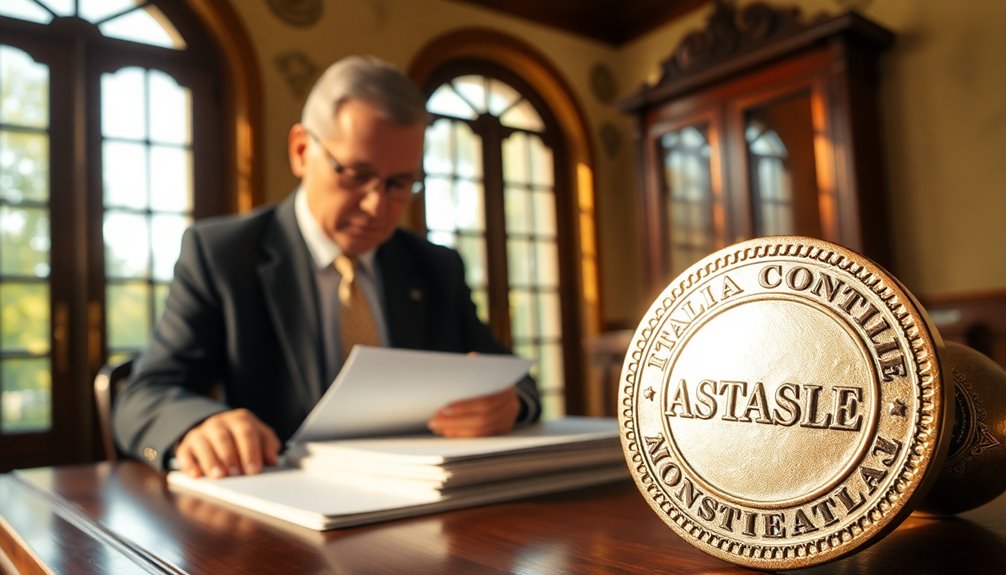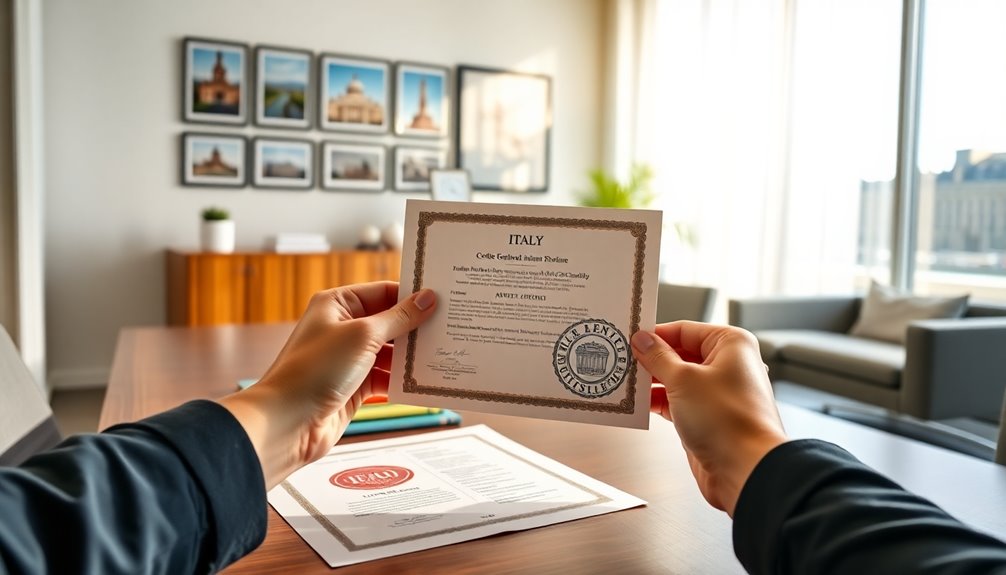An apostille in Italy serves as an authentication stamp that confirms your documents' legitimacy for international use. This certification is essential for having your documents recognized in other countries that are part of the Hague Convention. You'll typically need it for personal, educational, legal, and some commercial documents. The apostille is issued either by the Public Prosecutor's Office or Prefectures and is attached as a square-shaped sheet to the original document. It doesn't expire and simplifies the legalization process for your paperwork. If you want to know more about how to obtain one, just explore further.
Key Takeaways
- An apostille is an authentication stamp for documents intended for international use, confirming their authenticity in foreign countries.
- It serves as a replacement for the legalization process in countries that are part of the Hague Convention.
- Apostilles are issued by the Public Prosecutor's Office or Prefectures in Italy and appear as a square-shaped document attached to the original.
- Eligible documents include personal, educational, legal, and commercial papers, with certain exceptions like ID cards.
- Apostilles do not expire and are recognized in Italy and other Hague Convention signatory countries.
Definition of Apostille
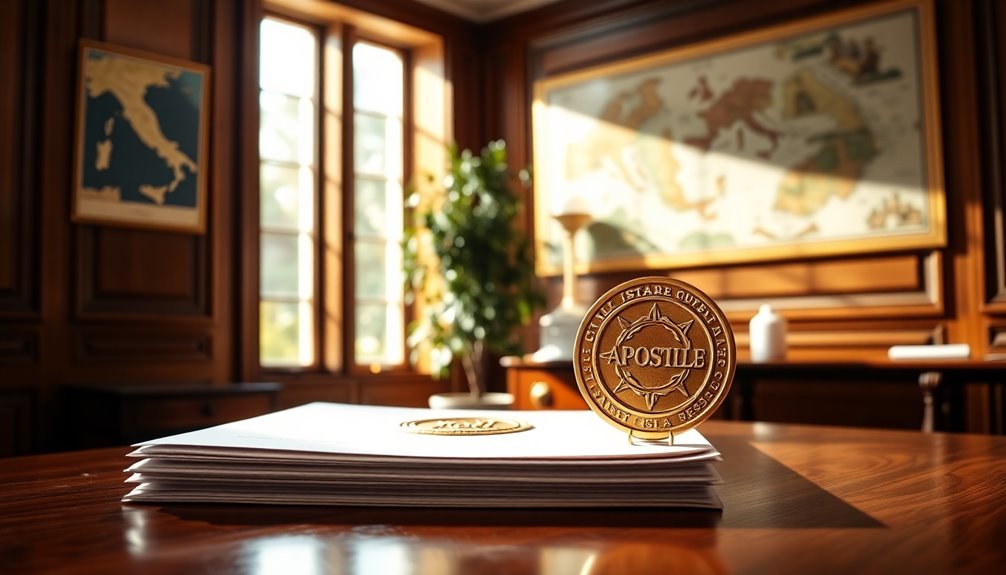
An apostille is a crucial stamp that authenticates documents for international use. It confirms that your document is real and official, making it easier to be accepted in other countries.
The apostille acts as an international pass, indicating trustworthiness and replacing the legalization procedure in Hague Convention signatory countries. You'll notice it appears as a square-shaped paper or stamp attached to your original document, featuring details like the word "Apostille," document type, issuing authority, and a unique number.
In Italy, the Public Prosecutor's Office or Prefectures issue apostilles, ensuring the document's legal effectiveness. This certification is globally recognized among Hague Convention members, facilitating the acceptance process without the need for translation.
Eligible Documents for Apostille

When seeking an apostille in Italy, it's important to know which documents qualify for this international certification.
You can start with personal and family documents like birth, death, divorce, and marriage certificates, as well as naturalization records if they apply to you.
Next, educational and academic documents such as diplomas, degrees, transcripts, and certificates of enrollment are also eligible. It is crucial to remember that U.S. documents require Apostille for validity in Italy.
Legal and administrative documents include court orders, powers of attorney, and notary-certified papers.
Finally, commercial and financial documents, like extracts from the Italian trade register, patents, and financial statements, can be apostilled too.
Knowing these categories helps streamline your process and guarantees you have the right documents ready for certification.
Requirements for Apostille in Italy
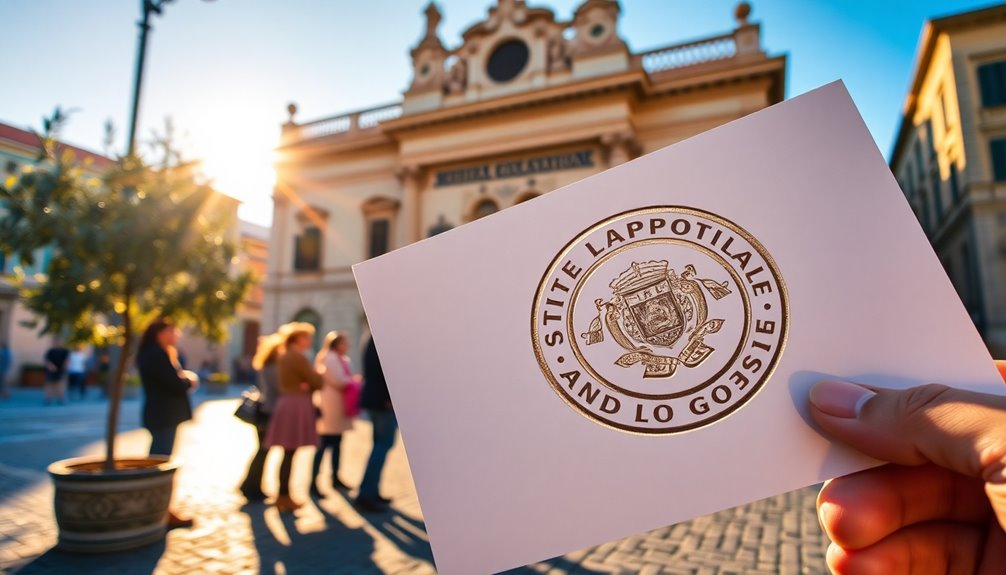
To obtain an apostille in Italy, you must meet several key requirements that guarantee the authenticity of your documents.
First, verify your document is official, like a birth or marriage certificate. If it's from a foreign authority, it should be issued within the last six months.
If the document's in Italian and needs to be used elsewhere, a certified translation might be necessary. It is important to note that foreign documents must be issued within this timeframe for validity.
Keep in mind that apostilles are only for countries part of the Hague Convention. They don't expire, so no second legalization is needed.
Finally, some documents, such as ID cards and personal letters, don't require an apostille, so check the specific regulations for your documents before proceeding.
Steps to Obtain an Apostille

Obtaining an apostille in Italy involves a series of clear steps that confirm your documents are properly authenticated.
First, get a certified copy of your document from the relevant public office. Make sure it's an official document, like a birth or marriage certificate.
Determine if a certified translation is needed if you plan to use it outside Italy.
Next, find the competent office, usually the Public Prosecutor's Office or Prefecture, and prepare your documents for submission. Legalization is required for documents to be recognized abroad, ensuring their authenticity.
Submit your application and pay any required fees.
After the office verifies your documents, they'll attach the Apostille stamp.
Finally, collect your apostilled document, which usually takes about a week. Verify it's valid for use in the intended country.
Format and Contents of Apostille
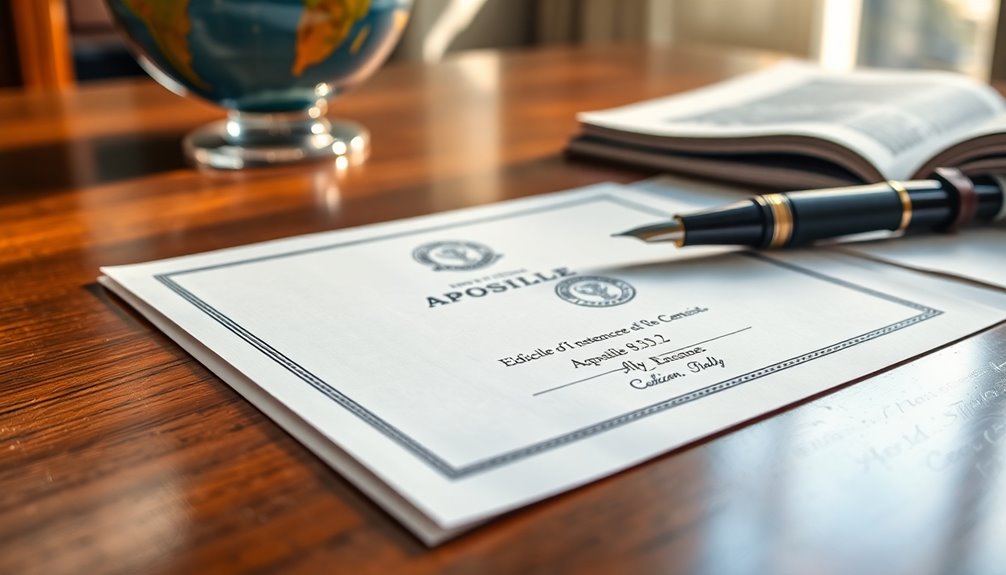
The apostille's format in Italy is designed to guarantee clarity and official recognition. Typically, it's a square-shaped sheet of paper attached to the original document, making them a single piece.
You'll find the word "Apostille" prominently at the top, along with references to the 1961 Hague Convention, often in French.
The contents include essential details like the type of document, the signatory's name and capacity, and the issuing authority's name. Additionally, the apostille serves as a certification for documents used internationally, ensuring their validity in foreign countries.
You'll also see the location and date of issuance, a unique identification number, and the country of origin.
Additionally, it features the seal or stamp of the issuing authority and their signature, ensuring legal compliance and international recognition.
Jurisdiction and Validity of Apostille
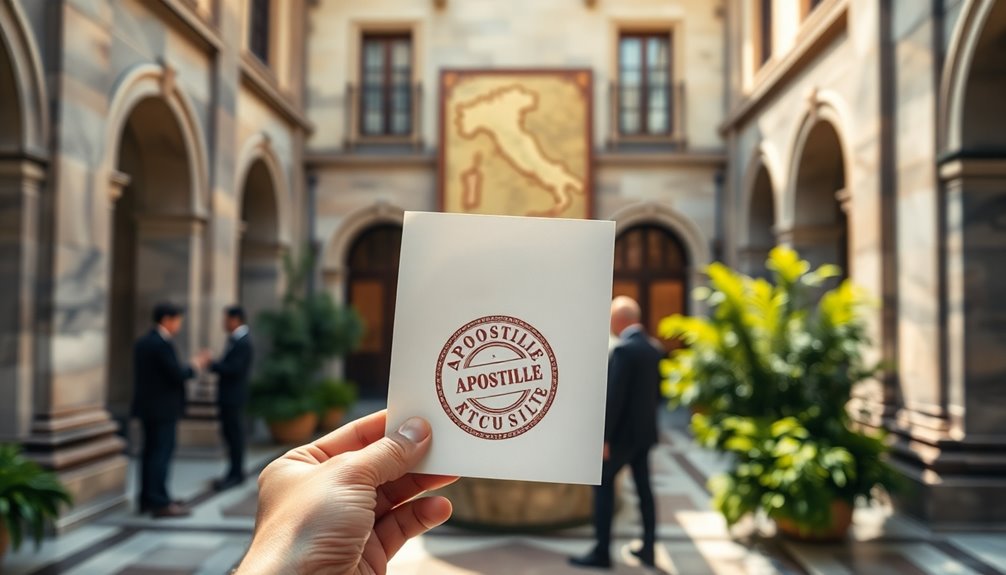
Understanding the jurisdiction and validity of the apostille in Italy is essential for guaranteeing your documents are properly recognized internationally.
As a party to the Hague Convention, Italy allows the Ministry of Foreign Affairs to oversee document legalization. This responsibility is delegated to the Public Prosecutor's Office and Prefectures, depending on the document type.
Apostilled documents are legally recognized in Italy and other signatory countries, confirming their authenticity without needing translation. Additionally, the apostille validates foreign public documents for use in member countries, which simplifies the process of document recognition.
However, if you're dealing with non-signatory countries, full consular legalization is necessary. Be aware that age and specific state laws may affect the apostille's validity.
Frequently Asked Questions
How Much Does It Cost to Obtain an Apostille in Italy?
The cost to obtain an Apostille in Italy can vary based on the issuing authority.
You'll need to check with the specific office for their fees, as there's no standard amount.
Don't forget that if you require certified translations, that'll add to your expenses too.
Payments are usually made via money order or personal check, so be prepared for that.
Additionally, regional differences might affect the overall cost, so inquire locally.
Can I Expedite the Apostille Process in Italy?
You can't officially expedite the apostille process in Italy.
The standard timeframe is about one week, depending on the province. While some service providers might help you manage the process more efficiently, they won't speed it up considerably.
For urgent needs, it's best to contact the public prosecutor's office directly. Ensuring your documents are complete and certified can help avoid delays and keep your processing time within the standard limits.
What Happens if My Document Is Rejected for an Apostille?
If your document's rejected for an Apostille, it usually means there's incorrect or incomplete information.
Check for any mismatches in names, dates, or places between your document and application. Verify you meet all requirements of the destination country, and that your notarization's valid and current.
To avoid rejection, double-check your supporting documents and forms, and make sure everything's correctly formatted before resubmitting your application.
Is an Apostille Necessary for All International Documents?
An apostille isn't necessary for all international documents.
You'll need it for official documents like birth or marriage certificates, academic diplomas, and certain business papers if you plan to use them abroad.
However, if you're using a document within its country of origin, an apostille isn't required.
Also, documents intended for non-Hague Convention countries might need a different form of authentication instead.
Always check the specific requirements for your situation to avoid issues.
How Long Is an Apostille Valid Once Issued?
Once you've got your apostille, it remains valid as long as the underlying document is valid.
There's no expiration date for the apostille itself; it doesn't need renewal unless the document becomes invalid.
For specific documents like birth or marriage certificates, the apostille is valid as long as those certificates are.
Just remember, if you make any changes to the document, you might need a new apostille to keep everything in order.
Conclusion
In summary, understanding the meaning of an apostille in Italy is essential for anyone needing to authenticate documents for international use. By knowing the eligible documents, requirements, and steps to obtain an apostille, you can streamline the process and guarantee your documents are valid abroad. Remember, the apostille serves as a valuable tool for verifying the authenticity of your paperwork, making it easier to navigate legal matters across borders.
